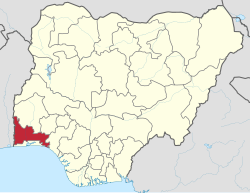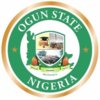Ogun State
Ìpínlẹ̀ Ògùn (Yoruba) | |
|---|---|
 Aerial view of Gbagura mosque in Abeokuta in Ogun State | |
| Nicknames: | |
 Location of Ogun State in Nigeria | |
| Coordinates: 7°00′N 3°35′E / 7.000°N 3.583°E | |
| Country | |
| Date created | 3 February 1976 |
| Capital | Abeokuta |
| Government | |
| • Body | Government of Ogun State |
| • Governor | Dapo Abiodun (APC) |
| • Deputy Governor | Noimot Salako-Oyedele (APC) |
| • Legislature | Ogun State House of Assembly |
| • Senators | C: Shuaibu Salisu (APC) E: Gbenga Daniel (APC) W: Solomon Adeola (APC) |
| • Representatives | List |
| Area | |
• Total | 16,980.55 km2 (6,556.23 sq mi) |
| • Rank | 24th of 36 |
| Population (2006 census) | |
• Total | 3,751,140 |
• Estimate (2022) | 6,379,500[1] |
| • Rank | 11 of 36 |
| • Density | 220/km2 (570/sq mi) |
| Demonym | Ogun |
| GDP (PPP) | |
| • Year | 2021 |
| • Total | $32.55 billion[2] 8th of 36 |
| • Per capita | $5,288[2] 11th of 36 |
| Time zone | UTC+01 (WAT) |
| postal code | 110001 |
| ISO 3166 code | NG-OG |
| HDI (2022) | 0.569[3] medium · 21st of 37 |
Ogun State is a state in southwestern Nigeria. As a Nigerian state, Ogun is the second most industrialised state after Lagos, with a focus on metal processing. It has good road and rail connections to the harbours in Lagos and Lekki. Wole Soyinka, winner of the Nobel Prize for Literature 1986, lives in Ogun.
Abeokuta is both Ogun State's capital and most populous city and the capital of Egba Kingdom; other important cities in the state include Ijebu-Ode, the capital of the Ijebu Kingdom, and Sagamu, the capital of the Remo Kingdom and Nigeria's leading Kola nut grower. Ilaro, the capital of Yewa(Egbado Kingdom).[4] Ogun state is covered predominantly by rain forest and has wooden savanna in the northwest.[5] Ogun State had a total population of 3,751,140 residents as of 2006,[6] making Ogun State the 16th most populated state in Nigeria.[7] In terms of landmass, Ogun State is the 24th largest State in Nigeria with land area of 16,762 kilometer square.[8]
Ogun State is predominantly Yoruba,[9] with the Yoruba language serving as the lingua franca of the state. The dominant religions in Ogun State are majority Christianity and minority Islam although a certain amount of traditional religion is still practiced.[10] Ogun State is noted for being the almost exclusive site of Ofada rice production. Ogun is also home to many icons in Nigeria in particular and Africa in general.[citation needed]
- ^ "Ogun State: Subdivision". www.citypopulation.de.
- ^ a b Okeowo, Gabriel; Fatoba, Iyanuoluwa, eds. (13 October 2022). "State of States 2022 Edition" (PDF). Budgit.org. BudgIT. Retrieved 7 March 2023.
- ^ "Sub-national HDI - Area Database - Global Data Lab". hdi.globaldatalab.org. Retrieved 13 September 2018.
- ^ "Ogun | state, Nigeria". Encyclopedia Britannica. Retrieved 23 September 2021.
- ^ Aderoju, Michael Atilade (2015). "Impact of kolanuts trade on socio-economic development of Sagamu, 1910-1970". Nigerian Journal of Economic History. 13: 167–188.
- ^ "Ogun State". Ogun Smart City. Retrieved 24 May 2020.
- ^ "National Results" (PDF). 19 May 2011. Archived from the original (PDF) on 19 May 2011. Retrieved 10 December 2021.
- ^ "World Gazetteer: Nigeria - administrative divisions (per geographical..." archive.ph. 5 January 2013. Archived from the original on 5 January 2013. Retrieved 10 December 2021.
- ^ "OGUN STATE". Ogun State Government Official Website. Retrieved 7 March 2021.
- ^ Oludare, Ishola (15 August 2021). "Declare public holiday for Ifa festival like Muslims, Christians – Traditionalists tell Abiodun". Daily Post Nigeria. Retrieved 8 December 2021.

